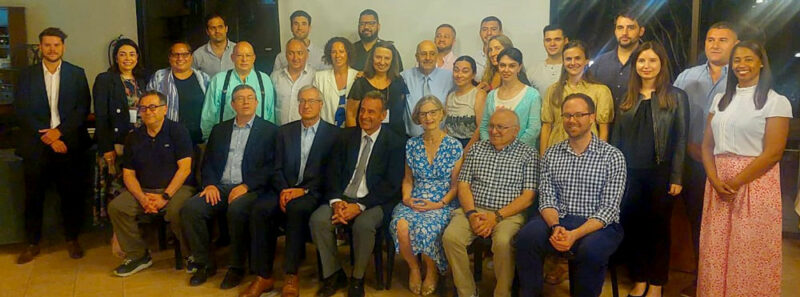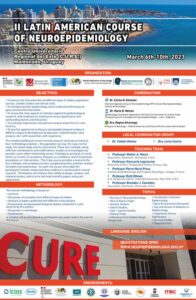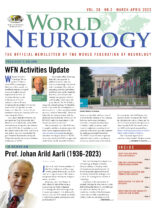Punta del Este, Maldonado, Uruguay | March 6-10, 2023
By Dr. Carlos N. Ketzoian

Participants in the II Latin American Course of Neuroepidemiology, Punta del Este, Maldonado, Uruguay, March 6th to 10th, 2023. In the center, Dr. Daniel Salinas, Minister of Public Health of Uruguay.
Last March, the II Latin American Course of Neuroepidemiology took place in Punta del Este, Maldonado, Uruguay. This course was organized by the neuroepidemiology section of the Institute of Neurology at the University of the Republic in Uruguay, and the Université de Limoges in France, with the endorsement of the World Federation of Neurology (WFN). The course was held at the Eastern Regional University Center (C.U.R.E.) of the University of the Republic, Uruguay.
 The I Latin American Course of Neuroepidemiology took place in Panama City, Panama, in April 2018. This II course was initially planned to take place in March 2020. Unfortunately, the COVID pandemic forced the organizers to postpone it until 2023. The structure and the content of these Latin American courses are based on the experience of the Erice’s International Course of Neuroepidemiology. (See World Neurology, posted Feb. 24, 2023. Report on the Ninth International Course of Neuroepidemiology: Methods and Clinical Applications worldneurologyonline.com).
The I Latin American Course of Neuroepidemiology took place in Panama City, Panama, in April 2018. This II course was initially planned to take place in March 2020. Unfortunately, the COVID pandemic forced the organizers to postpone it until 2023. The structure and the content of these Latin American courses are based on the experience of the Erice’s International Course of Neuroepidemiology. (See World Neurology, posted Feb. 24, 2023. Report on the Ninth International Course of Neuroepidemiology: Methods and Clinical Applications worldneurologyonline.com).
Twenty-one students, five teachers, three coordinators, and two invited speakers participated in five intense and enriching days of learning. Apart from local participants from Uruguay, the remaining students came from different Latin American countries: Argentina, Brazil, Chile, Colombia, Costa Rica, Dominican Republic, and Peru. Two participants came from outside of the region (Republic of Armenia).
Profs. Walter Rocca (U.S.), Giancarlo Logroscino (Italy), Pierre-Marie Preux (France), Ruth Ottman (U.S.), Brandon Coombes (U.S.), and Carlos Ketzoian (Uruguay) were part of the teaching team. The course was coordinated by Prof. Carlos Ketzoian (Uruguay), Prof. Regina Alvarenga (Brazil), and Drs. Fabián Gómez Elso and Lucía Castro (Uruguay).
Dr. Sebastián Ameriso from Argentina gave a lecture on the epidemiology of stroke in Argentina and Prof. Abayubá Perna from Uruguay gave a lecture on the genetic epidemiology of limb-girdle muscular dystrophy (LGMD) in Uruguay.
Study design aspects, genetic epidemiology, and statistical methods applied to neuroepidemiology were discussed in the morning. After lunch, the participants analyzed published clinical-epidemiological studies in which the different methodologies presented in the mornings were addressed. Each day, the activities ended with lectures on different topics.
The course activities also included the IV Journée d’Amitié Neurologique Franco-Panamericaine with lectures by Profs. Abayubá Perna (Uruguay), Regina Alvarenga (Brazil), and Pierre Marie Preux (France). The program was endorsed by the French Embassy in Uruguay. A cocktail reception took place after the lectures. The Minister of Public Health of Uruguay, Dr. Daniel Salinas, who is a neurologist, participated in this opening academic and social event. On Friday, March 10, the course closed with a social dinner of traditional “Asado Criollo” (Uruguayan barbecue).
Participants, professors, and coordinators had the opportunity to discuss in-depth different aspects of the clinical-epidemiological methodology for the study of neurological diseases. This full-immersion course format allowed total focus on the subjects, and the participants were not distracted by other activities during the day. The participants worked together for eight hours a day for five days.
We would like to emphasize that this kind of course corresponds to the objectives defined by the WFN Specialty Group on Neuroepidemiology during the meeting which took place Oct. 30, 2019, at the World Congress of Neurology in Dubai. •
Carlos N. Ketzoian is chair of the WFN Specialty Group on Neuroepidemiology.
